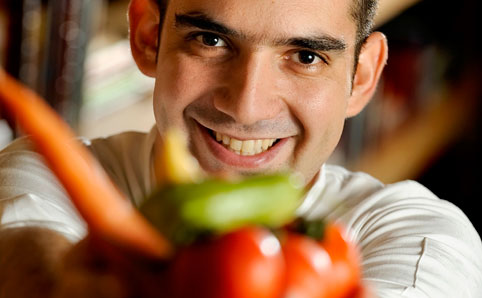
With São Paulo voters turning out in larger numbers than ever for the Green Party in the 2010 presidential elections – the Green presidential candidate Marina da Silva posted some of her best results here, with 21 per cent of the vote – it’s perhaps unsurprising to find restaurants in Brazil’s culinary capital also turning with increased interest to locally sourced, organic and sustainable food.
José Barattino, chef at the much praised Hotel Emiliano restaurant is one of the most visible pioneers of this fledgling movement. He uses ‘seasonal organic, biodynamic and ecological agro-forestry ingredients from small local producers’, as his menu declares, and has also helped set up a network of those small producers throughout the state to deliver fresh, new and ethical ingredients to homes and businesses in São Paulo.
Speaking in an interview in the bar of the modern and minimalist hotel, José says that at first, green politics had little to do with what he was looking for. ‘I wasn’t looking for sustainable food – I was just looking for good food. But as we started to look closer at where things were coming from, we realised the farmers had problems, whether money or otherwise. And we were always looking for better ingredients, so we realised we needed to get closer to the small producers supplying us.’
Organic food delivery
A few years on, the result is the project Sustentabilidade da Cadeia de Produção, which brings together 700 small producers. The public face of this project, Família Orgânica, delivers organic food to São Paulo, and is supported by the Emiliano. Recently, they held a small farmer’s market, Emiliano Market Day, inside the chic hotel on Rua Oscar Freire in Jardins. It’s a long way from the rural interior of São Paulo, where Dercilio Pupin of Família Orgânica didn’t even have access to electricity until he was 10 years old.
‘When José found us, we realised we were dealing with a team that really cared about supporting organic products,’ says Pupin. ‘From that point on, all the Família Orgânica producers began to work intensely, not only to sell products and in developing new seeds and products, but also to make fair trade possible.’
Reaping the rewards
Though he says Brazil is still far behind many of the Northern countries at the forefront of the sustainable/slow-food movement, the diversification for the small producers into delivery service in São Paulo has paid off. In six months, they've made more here than they did in four years when they were purely serving Campinas, close to where most of the small producers are based.
Barattino hopes that by showing how successful a sustainable approach can be, for the livelihoods of the farmers and for the quality of the food in the dishes he serves, he can help change São Paulo's food culture. ‘In Brazil, we don’t have a strong food culture. In reality, Brazilians worry very little about what they are eating. We'd like to see them think a little more about it.’
Sustainability, he says, needs to take on Brazilian contours in order to become truly meaningful. ‘There are three targets: economic, social, and environmental. For the social aspect, we have to make sure that the children on the family farm aren’t working and that they go to school, things like that. And on the economic side, we have to ensure a market so people can make a living.’
Some things, however, cannot be sacrificed. ‘I have to be clear: I can’t say we make fully sustainable food at the moment,’ he says. ‘For example, our salmon comes from farms in Chile, but I can’t turn up tomorrow and tell my customers there won’t be any salmon. Impossible. There’s lots of room for the natural food movement to grow,’ he says, laughing, ‘but we can't do it all in one go’.
Update: José Barattino left the restaurant at the Emiliano in july 2013 to focus on other projects



